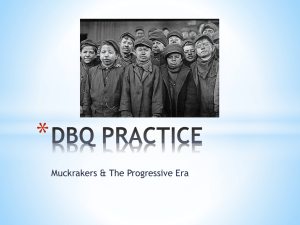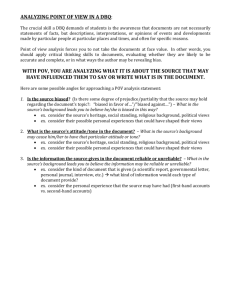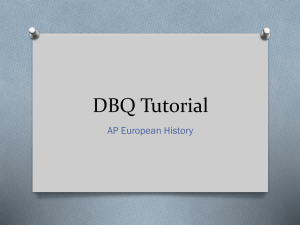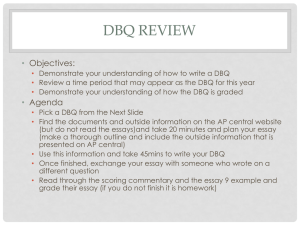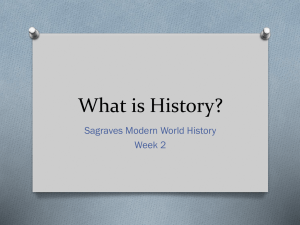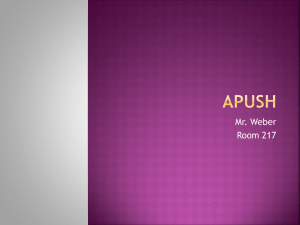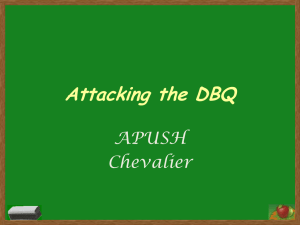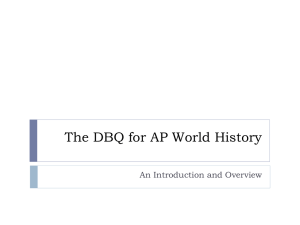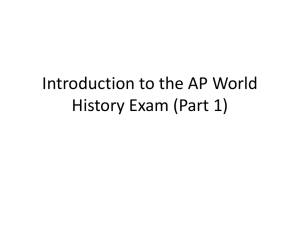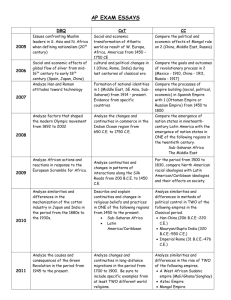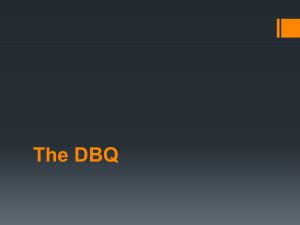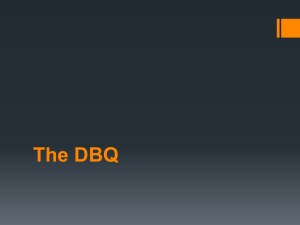The DBQ: Document Based Question
advertisement
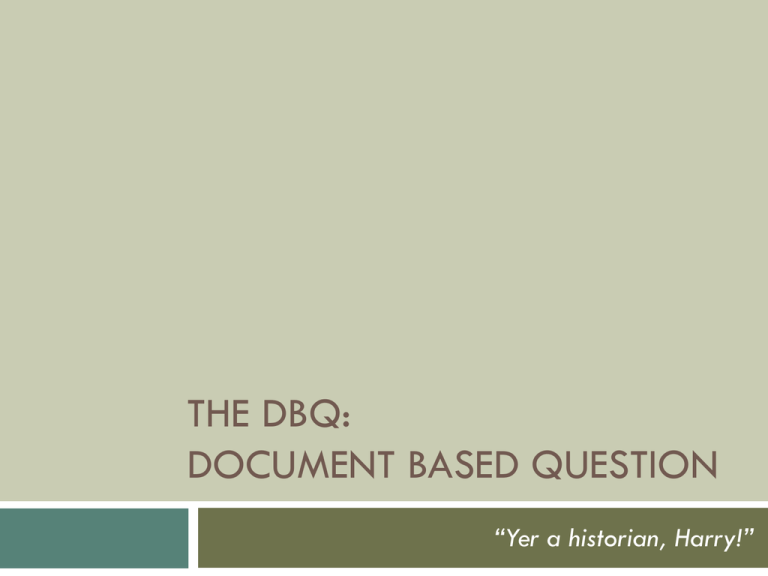
THE DBQ: DOCUMENT BASED QUESTION “Yer a historian, Harry!” Why the DBQ is awesome: • You don’t have to actually know any facts or dates • You don’t have to remember anything from class • All you have to do is think The DBQ and the other FRQs The DBQ You are provided with evidence The skill being tested is critical evaluation Your role is to be a HISTORIAN The CCOT and COMP You must recall evidence The skill being tested is memory/knowledge Your role is to be a STUDENT Why require a DBQ? The most important skill for historical study is critical thinking. Historical evaluation requires context. In order to write an effective DBQ… You must be able to: Evaluate the question and place it in context. Consider the source of each document. Allow the documents to lead your research. Craft a claim supported by the documents. Group and utilize the documents to answer the question. Planning Your Paper Please, please, please don’t skip this step. Planning your Paper The biggest cause of great papers getting a “1”: NOT ANSWERING THE QUESTION What is the difference? Evaluate the political and economic effects of Mongol rule in China from 12001450. Analyze the effects of social and cultural tensions arising from Mongol rule in China from 1200-1450. Planning your Paper The solution: Take time to read and plan. (PS: Don’t worry if you don’t know anything about the question – AP is doing that on purpose!) The 10 minute planning period Underline words that define your task. Circle words that limit your scope (no need to worry about time period here). Now is the time to start thinking about documents you want to see! Planning your Paper “Historical Background” section Sometimes (not always) included. If it’s there, read it carefully. DO NOT quote from it or try to use it for your introduction. This is a waste of time Papers that do this tend to be weak Planning your Paper Use the majority of your planning time for the documents: Between 4 and 10 documents The source is as important as the content Be sure to go through documents quickly and efficiently Make many marks on the document sheets! Nothing in the green essay booklet is scored or even read. Planning your Paper – Final Steps RE-READ THE QUESTION! Are Group your documents in an analytical way Do you clear on what is being asked? your groups help you make your point? Use your groups to write a clear, specific, and analytical thesis. Include the time period! Grouping Good Groups (depending on question) Chronological groups Social/Political/Cultural groups Intended audience Purpose of docs Attitude or tone of docs Geographic area Generally bad groups Types of documents (maps, speeches, etc) “Laundry lists” Your grouping is the most key part of your analysis. A thesis is clear, specific, and analytical! Not a Thesis: “There were many political and economic effects of Mongol rule in China.” “The Mongols increased trade in China and elevated the status of merchants.” A thesis! “During the time period from 12001450, Mongol rule threatened Confucian political beliefs, while strengthening foreign trade over the Silk Road.” “For the period 1876-1908, analyze how the Ottoman government viewed ethnic and religious groups within its empire.” Theses that don’t work – “There were many ways in which the Ottoman government viewed ethnic and religious groups.” (too bland & vague) “The Ottoman government brought reforms in the constitution of 1876. The empire had a number of different groups of people living in it, including Christians and Muslims who did not practice the official form of Islam. By 1908 a new government was created by the Young Turks and the sultan was soon out of his job.” (paraphrases historical background & doesn’t address the question) “People of different nationalities reacted differently to the Ottoman government depending on their religion.” (gets the question backwards) “For the period 1876-1908, analyze how the Ottoman government viewed ethnic and religious groups within its empire.” Theses that DO work – “The Ottoman government took the same position on religious diversity as it did on ethnic diversity. Minorities were servants of the Ottoman Turks, and religious diversity was tolerated as long as Islam remained supreme.” “Government officials in the Ottoman Empire were able to send out the message that all people in the empire were equal regardless of religion or ethnicity, yet an underlying reality was that the Turks and their version of Islam was superior.” The Documents What makes a DBQ! The funeral procession of former British prime minister, Margaret Thatcher, travels along Fleet Street to her funeral service at St Paul's Cathedral, in London April 17, 2013. What can a document show? Can you use documents together? “If our people feel that they are part of a great nation and they are prepared to will the means to keep it great, a great nation we shall be, and shall remain. So, what can stop us from achieving this? What then stands in our way? The prospect of another winter of discontent? I suppose it might. But I prefer to believe that certain lessons have been learnt from experience, that we are coming, slowly, painfully, to an autumn of understanding. And I hope that it will be followed by a winter of common sense. If it is not, we shall not be—diverted from our course. To those waiting with bated breath for that favorite media catchphrase, the 'Uturn', I have only one thing to say: 'You turn if you want to. The lady's not for turning.' I say that not only to you but to our friends overseas and also to those who are not our friends.” -Margaret Thatcher, 1980 Possible Documents Spoken quotes Written excerpts from various sources Photos Charts & Graphs Maps Propaganda & Cartoons ALWAYS REMEMBER TO PUT DOCUMENTS IN CONTEXT! Point of View (POV) What is POV? The specific worldview of the author Composed of experiences, prejudices, priorities, etc. Who has a POV? Everyone and everything. Why worry about POV? We cannot ever escape it. We must account for it and even make it useful in our analysis. POV is a tool, not an stumbling block! Point of View (POV) Questions to ask: What is this person’s background? What position are they likely to hold? What position do they hold? Are they reliable on the subject? What is their class? Gender? Occupation? Status? Is the date significant? Remember: There are no trick documents. Every document is chosen because it is useful for a specific purpose. The Additional Document The Task: Identify a “missing voice” Must NOT be included in the documents already! Must be a document that could actually exist! What other document would you, as a historian, need? State specifically WHY you need this document Like your POV and groups, this should be analytical The Additional Document Possible types of missing voices: Specific class or occupational group Social caste Women Graphic or data Illustration or photo (for late DBQs) The Additional Document Ineffective (no points) I would like to have seen a document from a medieval farmer to see what he would say. Effective (good for the point) A political cartoon from World War I would help me make my point. I need a document from a woman to see what her point of view was. I would like to seeofficial orders from the Ottoman government on how to treat different ethnic and religious subjects since such a document could show how the government implemented its policies. A shipping manifest of items shipped to American troops in Europe would help me evaluate the economic impact of World War II in the USA. Your Score To get a nine, you must first get a seven. How I Score 1. I read your DBQ. 2. 3. 4. As I encounter docs & groups, I notate them. I check off other rubric points as I find them. I usually do not re-read. If (and only if) you scored a perfect 7, I re-read for expanded core points. Some rubric points are graded more strictly in a given year. How I Score Things that make me frown: 1. 2. 3. 4. If If If If I cannot read your paper you write in pencil you don’t cite your documents you write in “text-speak” How I Score Things that make me smile: 1. 2. 3. 4. 5. 6. You write a clear and intelligent thesis Your groups mirror your thesis and make it easy to follow You understand why each document was included You identify an important missing voice You evaluate more than two POVs intelligently. You write a paper that stands together – not just satisfying each rubric point. (If you do these things, I am more likely to re-read your paper and make sure I’m not missing any points to give you.) Past DBQ Questions The relationship between cricket & politics in Southeast Asia from 1880-2005. (2012) The causes and consequences of the Green Revolution from 1945-present. (2011) Compare mechanization of the cotton industry in Japan and India from 1880-1930s. (2010) African actions and reactions in response to the European Scramble for Africa. (2009) Past DBQ Questions Factors that shaped the modern Olympics movement from 1892-2002. (2008) Han and Roman attitudes toward technology. (2007) Social and economic effects of the global flow of silver from 1500-1750. (2006) Issues that 20th century Muslim leaders in South Asia & North Africa confronted in defining their nationalism. (2005) Past DBQ Questions Analyze the responses to the spread of Buddhism in China. (2004) Main features, causes, and consequences of indentured servitude in the 19th and 20th centuries. (2003) Compare attitudes of Christianity and Islam towards merchants and trade from their origins until about 1500. (2002) That’s the DBQ Any questions?
